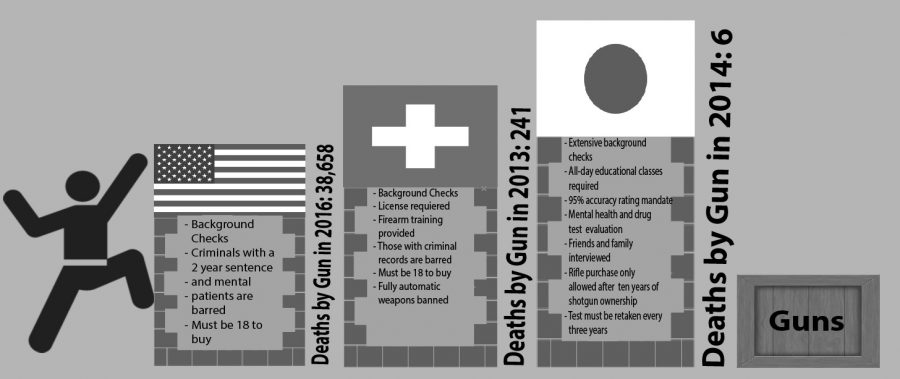Shots heard around the world: How do American gun laws compare to those of other developed nations
Japan enforces some of the strictest gun laws in the world. In 2014, there were only six deaths by firearm in the entire nation. The U.S. has less stringent gun control laws and had 38,658 gun related deaths in 2016. In response to the Parkland school shooting, the Florida state legislature raised the minimum age to buy a firearm from 18 to 21.
March 29, 2018
Following the recent mass shootings in the United States, advocates have spoken out against the leniency of American gun regulations compared to those of other countries.
Americans make up five percent of the world’s population and own nearly half of civilian-owned guns worldwide. The country has experienced more than 1,800 deaths by gun this year according to Gun Violence Archive, a non-profit that tracks every incident of gun violence in the U.S.
National gun laws in the U.S. dictate that citizens and legal residents must be at least 18 to purchase shotguns, rifles or ammunition, and gun dealers must conduct a background check before selling a gun to a prospective buyer. But some states have different individual processes. For example, Oklahoma allows for the possession of a firearm without a permit, and in Arizona, one can conceal carry a weapon without a license.
With the United States’ robust gun culture comes an equally strong group of gun control critics. The National Rifle Association, a non-profit organization that promotes the Second Amendment, is one of the nationally-established groups that speak out against gun control. Institutions like the American Firearms Association and the National Association for Gun Rights endorse the argument that gun regulation infringes on the rights of American citizens. However, gun control proponents argue that the sentiments of U.S. gun culture threaten the safety of citizens.
“Congress should take sensible steps to address the role of weapons of war in civil society,” Anna Eshoo, the U.S. Representative for California’s 18th congressional district, said. “For too long, unreasonable forces have prevented serious consideration of virtually any gun legislation, no matter how common-sense it is. I reject this shortsighted view, as do the vast majority of the American people and the law enforcement community who want to reduce gun violence, without threatening the rights of law-abiding Americans.”
There were approximately 88.8 guns per 100 people in the United States in 2007 and 0.6 guns per 100 people in Japan according to the Small Arms Survey, an independent research group that collects data on small arms and armed violence. The Japanese weapons law of 1958 states that “no one shall possess a firearm or firearms or sword or swords,” whereas the Second Amendment clearly supports the right of an American citizen to own a gun.
In Japan, citizens can purchase firearms for hunting and shooting sports only after completing an extremely lengthy background check. Applicants must attend an all-day class, pass a written test and receive at least 95 percent on a shooting range test. They then must pass a mental health evaluation at a hospital and a licensing procedure, in which authorities check the criminal record of the applicant and hold interviews with his or her family and friends. Every three years, weapon owners must retake the class as well as the initial test, and they can only purchase a rifle after 10 years of shotgun ownership.
Off-duty police in Japan cannot carry firearms, unlike in the U.S. In a country of more than 127 million people, Japan saw six gun deaths in 2014. The U.S. saw 33,599 fatalities in the same year.
Switzerland also has a low gun death rate similar to Japan’s. A United Nations report states that there were 0.5 homicides per 100,000 people in Switzerland, where the U.S. had five homicides per 100,000 people in 2010.
In a country of 8.3 million people, there are approximately 2 million civilian-owned guns, which translates to about 24 guns per 100 people. The National Rifle Association has previously used Switzerland in its marketing campaigns as a prime example of a peaceful country with a high number of guns.
A license is required for purchasing a gun in Switzerland, yet rifles and semi-automatics are exempt from this requirement. Permits to carry a gun around in a public setting are rarely issued to civilians. Switzerland also hosts shooting contests for teenagers, and all men are required to fight for the militia, where they learn how to properly handle a gun. The country also enforces an armed neutrality policy, which dictates that Switzerland is not to engage in an armed conflict with any other country. This policy was designed to ensure internal peace and security.
In order to comply with new laws implemented by the European Union, Switzerland will amend some of its policies that will, in turn, further restrict who can buy what guns.
“The Federal Council submitted draft legislation and proposed a pragmatic solution to incorporating the directive into Swiss law, a solution that upholds Switzerland’s shooting tradition,” Michael Maccabez, Media and Communications Manager for the Embassy of Switzerland in Washington D.C., said. “The upgrading of firearms which, up to now, were class B weapons, weapons subject to authorization, into class A weapons, prohibited weapons, requires the Weapons Act to be amended. Sports marksmen, collectors and museums must comply with additional requirements.
Countries like Switzerland have successfully maintained peace with societies that support guns. Nevertheless, the United States’ omnipresent gun culture has created passionate discussions between the two opposing factions.
This piece was originally published in the pages of the Winged Post on March 29, 2018.


















![“[Building nerf blasters] became this outlet of creativity for me that hasn't been matched by anything else. The process [of] making a build complete to your desire is such a painstakingly difficult process, but I've had to learn from [the skills needed from] soldering to proper painting. There's so many different options for everything, if you think about it, it exists. The best part is [that] if it doesn't exist, you can build it yourself," Ishaan Parate said.](https://harkeraquila.com/wp-content/uploads/2022/08/DSC_8149-900x604.jpg)




![“When I came into high school, I was ready to be a follower. But DECA was a game changer for me. It helped me overcome my fear of public speaking, and it's played such a major role in who I've become today. To be able to successfully lead a chapter of 150 students, an officer team and be one of the upperclassmen I once really admired is something I'm [really] proud of,” Anvitha Tummala ('21) said.](https://harkeraquila.com/wp-content/uploads/2021/07/Screen-Shot-2021-07-25-at-9.50.05-AM-900x594.png)







![“I think getting up in the morning and having a sense of purpose [is exciting]. I think without a certain amount of drive, life is kind of obsolete and mundane, and I think having that every single day is what makes each day unique and kind of makes life exciting,” Neymika Jain (12) said.](https://harkeraquila.com/wp-content/uploads/2017/06/Screen-Shot-2017-06-03-at-4.54.16-PM.png)








![“My slogan is ‘slow feet, don’t eat, and I’m hungry.’ You need to run fast to get where you are–you aren't going to get those championships if you aren't fast,” Angel Cervantes (12) said. “I want to do well in school on my tests and in track and win championships for my team. I live by that, [and] I can do that anywhere: in the classroom or on the field.”](https://harkeraquila.com/wp-content/uploads/2018/06/DSC5146-900x601.jpg)
![“[Volleyball has] taught me how to fall correctly, and another thing it taught is that you don’t have to be the best at something to be good at it. If you just hit the ball in a smart way, then it still scores points and you’re good at it. You could be a background player and still make a much bigger impact on the team than you would think,” Anya Gert (’20) said.](https://harkeraquila.com/wp-content/uploads/2020/06/AnnaGert_JinTuan_HoHPhotoEdited-600x900.jpeg)

![“I'm not nearly there yet, but [my confidence has] definitely been getting better since I was pretty shy and timid coming into Harker my freshman year. I know that there's a lot of people that are really confident in what they do, and I really admire them. Everyone's so driven and that has really pushed me to kind of try to find my own place in high school and be more confident,” Alyssa Huang (’20) said.](https://harkeraquila.com/wp-content/uploads/2020/06/AlyssaHuang_EmilyChen_HoHPhoto-900x749.jpeg)











